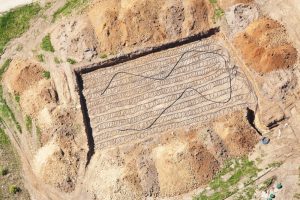 If you’re in the market for a new heater, there’s really no better option than a geothermal system (and not just because of the 30% tax credit). When you look at what this system has to offer—both in technology and in its operations—it’s tough to say “No.” However, we won’t try and say that geothermal heating services are a good fit for every homeowner.
If you’re in the market for a new heater, there’s really no better option than a geothermal system (and not just because of the 30% tax credit). When you look at what this system has to offer—both in technology and in its operations—it’s tough to say “No.” However, we won’t try and say that geothermal heating services are a good fit for every homeowner.
We’ll explain a little about what these systems are, why we love them, and what you would need to consider before installing one.
So, Just What Are They?
Inside your home, the geothermal heater operates just like a forced-air system. It’s capable of generating either cold or warm air, so you can use it all year-round. It can cool or heat your entire home effectively through the use of air ducts.
From the perspective of the homeowner or a guest, you wouldn’t be able to tell it apart from a normal air conditioner or furnace.
However, that’s only taking into account half of the system. The other half consists of several feet of metal loops, buried about 15 feet below the ground. This is the portion of the system that is responsible for creating cool or warm air.
They’re Heat Pumps
What makes a geothermal system special is that it’s a kind of heat pump. Specifically, a ground-source heat pump. Here’s why that matters:
- Heat pumps can operate as either an air conditioner or a heater, simply by flicking the switch.
- In the simplest of terms, they create warm air by “recycling” the air. This is far more efficient than combustion.
- Heat pumps are the least expensive electric HVAC systems on the market.
The Ground-Source Difference
Heat pumps are normally air-source, meaning they heat or cool your home using the outdoor and indoor air as a source. While this is efficient for most of the year, particularly cold weather can force an air-source heat pump to turn on its auxiliary heating mode—and that can cost a little bit more.
On the other hand, ground-source heat pumps take advantage of the fact that temperatures beneath the soil remain the same all year-round. You can guarantee efficient heating all year-round.
What to Keep In Mind
There are plenty of benefits to a geothermal system, but depending on who you are, some of those could be a “con” rather than a “pro.”
- Long lifespan: The loops in a geothermal system are estimated to last nearly 50 years. You might not want to install this system in a home that you don’t plan to stay in for life.
- Still a forced-air heater: Although forced-air heaters make up a majority of heating products on the market, some would prefer a method that doesn’t involve blowing hot air around the home, such as a radiant heating system.
- Ducts: Ducts are a cost-effective way to send cooled or heated air through your home, but they can require maintenance every few years. Some prefer the flexibility of ductless systems instead.
To learn more about geothermal heating systems, contact Collier’s Comfort today. True Comfort, True Savings.
